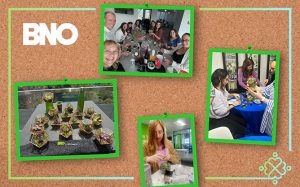Involve
Gen Z Unlocked: Thriving with the Class of 2024 at Work

As a creative marketing agency with multiple employer branding and talent acquisition clients, we’re constantly tracking demographic trends that are useful not only in our own search for diverse, exceptional talent, but are also invaluable to our client partners’ hiring needs. And while Gen Z has been trickling into the workplace for the last four years, when the class of 2024 graduates, one-quarter of the U.S. workforce will be Gen Zers. This number will grow exponentially over the next six years.
Are your human resource, talent acquisition, and recruiting colleagues truly tuned into what resonates with this group, their work preferences, and how they really feel about remote work? How does Gen Z approach their job search? What values, perks, and benefits matter to them? Understanding this generation—from knowing what inspires or frightens them, to an awareness and appreciation of their values—could be a determining factor in the success of your recruitment for a long time.
Learning from secondary research—and conducting our own
BNO recently attended several Gen Z-focused webinars and talks where some interesting—and probably to some, surprising—Gen Z stats surfaced. But being an agency with customer experience (CX) and design thinking in our DNA, we decided to take advantage of a process we employ for our clients, albeit used here on a much smaller scale—talking to the audience in question to really understand their needs, their concerns, and their purpose.
We gathered a healthy sample of BNO’s Gen Zers from each of our three locations to see if they were in agreement with the faceless stats we had assembled. But more importantly, we wanted to get beyond the numbers and tap into some of the emotions and rationales which paint a more thorough, persona-like picture of a group of human beings.
Here are some things we uncovered, along with surrounding rationales and thoughts.
“It’s important for companies to express their values on their career site so candidates get a sense of their culture.”
Salary transparency: Like it or not, it’s here—so are financial insecurities
The research showed that Gen Z is all for salary transparency. Getting into the “why” sheds some light on other concerns of theirs as well.
Along with millennials, many Gen Zers are of a generation where their overall financial outlook is negative when compared to their parents. They see themselves losing ground. Because of this, and because they perceive searching around for salary ranges to be “super annoying,” a “waste of time,” and “old school,” not to mention the gender gap in salaries, they want it posted and up-front.
They also come from a generation that is not comfortable negotiating salary with a manager or for their first position. On the flip side, they are quite comfortable in sharing and talking salary with peers. So, if you’re a boomer or millennial in leadership and think salary amounts are between you and each employee, think again.
“It’s super annoying to have to search for salary information or wait until late into the interview to find out my potential salary—make it transparent.”
Financial worries are the #1 issue keeping Gen Z up at night, exacerbating mental health concerns
Gen Z is feeling the increased cost of living. Even though they have plenty of runway left, it is lined with anxiety. “A house and kids at some point are really important to me, but how am I going to afford either?” is a lament we heard many times. This insecurity can foster self-doubt and a feeling of helplessness. These are good things to keep in mind when building out your company’s benefits package, where ongoing financial literacy workshops and mental health perks can often be added at little or no cost from 401(k) or health insurance vendors.
One of our Gen Zers cited a Forbes article that stated “42% of Gen Z has received a mental health diagnosis, and 70% say their mental health needs attention or improvement.” This is a generation who, according to the American Psychological Association, “has been at the forefront of some of the world’s most traumatic events and experiences, from the global pandemic to mass school shootings.” If we’re expecting Gen Z to bring their best selves to work, they might need a bit of help along the way.
“I’m a big supporter of mental health policies that show a company is invested in me as much as they want me to be invested in them.”
Speaking of bringing their best selves to work, what about that hybrid/WFH/in-person option?
The stats tell us that the “preferred” way of working lines out like this:
- 74% Hybrid
- 16% Remote
- 10% In-person
We’ve also learned that 69% of Gen Z is more likely to apply to a job with a flexible schedule.
Our BNO Gen Zers all leaned toward a hybrid model, which we currently employ. But like their millennial “cousins,” Gen Z wants and needs some face time for receiving feedback and input, as well as help in learning their craft, and the camaraderie that comes with face-to-face interaction. Said one, “I like the ability to go into the office and meet my coworkers, but I also like the flexibility of working from home, especially to cut down costs for commuting.”
Another concern common to many of our audience, aside from financials, was lack of time. “Time is the most valuable resource I have,” said one. “So not having to commute is super nice.” Another Gen Zer added, “Not commuting feels like the one thing I can do to help out the environment.” And finally, touching on the mental health aspect, a Gen Zer said, “Fully remote is not for me, but knowing I could work from home really provides peace of mind.”
“I’m a lot more productive when I work at home—it’s easier to focus and get my work done during the day.”
Corporate welcome mats and red flags for Gen Z
Work-life balance was a common concern, which plays into the idea of time being a treasured asset for this generation. That balance was also part of considering a company’s overarching culture. “Fostering a culture of workaholics,” or “expectations that staff regularly work nights and/or weekends,” was a huge turnoff. On a similar note, the group would not consider companies who don’t have a strong employer brand presence, whether that be online profiles, attendance at in-person events, or personalized messaging in communications. “If I can’t get a really good sense of the company’s culture, what’s in it for me, what’s it like to work there, I’m done,” said a Gen Zer.
“Companies that foster a culture of ‘workaholics’ and no clear path to growth are turnoffs to me.”
Workplace culture continues to evolve—so must workers
Speaking of culture, another Gen Zer said she’d stop her search on the first sign of “old-fashioned ways of thinking and working—hierarchical models and mindsets.” And while many agreed that company and employee values don’t need to mesh 100%, all agreed that not feeling supported—no matter who they were—or not feeling safe to bring their authentic self to work was an immediate nonstarter. Again, for candidates to see and (better yet) feel these things, your employer brand and unique value proposition need to be expressive, well thought out, and easy to access.
This article, the discussions that informed it, and the research that inspired it, barely touch the surface of the deep dives we do for our clients. If you’re feeling challenged or have concerns that the brand messaging you’re putting out there might not be connecting with Gen Z (or any other demographic), whether it be potential candidates or a target demographic for your sales or service, we’d be happy to host a no-strings-attached workshop to dig a little deeper. With the last of the Gen Z graduate classes hitting the workforce in six years, the time to act is now.



